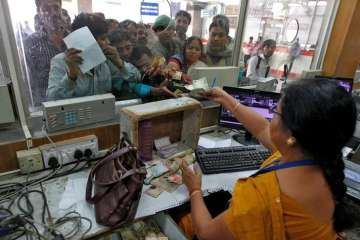In an attempt to curb the bee lines at banks, the finance ministry has come up with a method that would prevent the counters from being overcrowded by repeat exchangers of scrapped high denomination currency notes.
Starting tomorrow, a small mark of indelible ink, used mostly during elections to prevent multiple voting, will be put on the right hand finger of those exchanging banned 500 and 1,000 rupee notes for new ones.
This would avert the ones who have already made the exchange from making repeated visits to banks.
As per the assessment of the finance ministry, bank counters are getting overcrowded due to same people turning up again and again to exchange old notes.
"Ideally, the ink mark should have been put on the left hand as is done when a person casts his vote. But with by-elections due in some states, an ink mark for exchange or withdrawal of currency note on the left hand will lead to unnecessary difficulties. So it has been decided that the ink mark would be put on right hand," an official said.
The ink manufactured at the Mysore Paints and Varnish Ltd - the firm that has supplied indelible ink to the Election Commission since 1962 to mark voters, will be made available to banks and post offices from tonight.
Banks in major cities will start marking note exchangers with the ink, the official said.
Also, an expert committee comprising of officers from the Department of Economic Affairs and the Department of Financial Services are preparing standard operating procedure (SoPs) for ink marking as well as additional steps to be taken to manage the crowds.
The move comes amid long, unending queue at banks even after a week of Prime Minister Narendra Modi announcing withdrawal of old Rs 500/1000 notes in biggest crackdown on black money, corruption and counterfeit currency.
The notes withdrawn accounted for 86 per cent of the cash circulating in the Asia's third-largest economy.
The source said the use of indelible ink would prevent "unscrupulous persons" from use conduits for exchanging notes.
A person, as per the revised guideline, is allowed to exchange old notes totalling up to 4,500 on a single day.
Earlier in the day, economic affairs secretary Shaktikanta Das said it was noticed that the same people were coming back again and again to exchange notes, causing the long queues and creating hassles for genuine people to get their cash.
By-elections for four Lok Sabha seats - Cooch Behar and Tamluk in Purba Medinipur district in West Bengal, Shahdol in Madhya Pradesh and Lakhimpur in Assam will be held on November 19.
As many as 8 assembly seats in Assam, Arunachal Pradesh, Madhya Pradesh, West Bengal, Tamil Nadu, Tripura and Puducherry will go to polls on the same day.
(With PTI inputs)
Latest Business News
